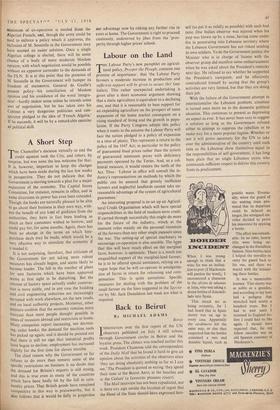A Short Step
THE Chancellor's decision virtually to end the credit squeeze took the City, and others, by surprise, but was none the less welcome for that. It is, however, important to keep the changes which have been made during the last few weeks in perspective. They do not indicate that the Government is moving towards a plan for a major expansion of the economy. The Capital Issues Committee, for instance, remains in office, and in some directions its power has even been extended. Though the banks are naturally pleased to be able to go about their business in their own way, with- out the benefit of any kind of guidance from the authorities, they have in fact been lending as much as their customers wished to borrow, and could pay for, for some months. Again, there has been no charfge in the terms on which hire- purchase deals may be made, which would be a very effective way to stimulate the economy if it needed it.
It is not surprising, therefore, that criticism of the Government for not taking more robust measures has already begun, and seems likely to become louder. The fall in the number of plans for new factories which have been approved seems at first sight to be disturbing. But the amount of factory space actually under construc- tion is more stable, and in any case the building and civil engineering industries are increasingly Occupied with work elsewhere, on the new roads, and on local authority projects. Moreover, other Pointers confirm that the economy remains more buoyant than most people• thought possible in times of recession abroad and restriction at home. Many companies report increasing, not decreas- ing, order books; the demand for machine tools has picked up again; and it should be pointed out that there is still no sign that industrial profits have begun to decline; employment has increased slightly for the first time for eleven months.
The chief reason why the Government so far refuses to do more than remove some of the specific restrictions on business is no doubt that the demand for Britain's exports is still strong, and this is true even in many of the countries which have been badly hit by the fall in com- modity prices. That British goods have remained competitive in this way is praiseworthy, but it also follows that it would be folly to jeopardise our advantage now by risking any further rise in costs at home. The Government is right to proceed cautiously, undeterred by jibes from the 'pros- perity through higher prices' school.


































 Previous page
Previous page